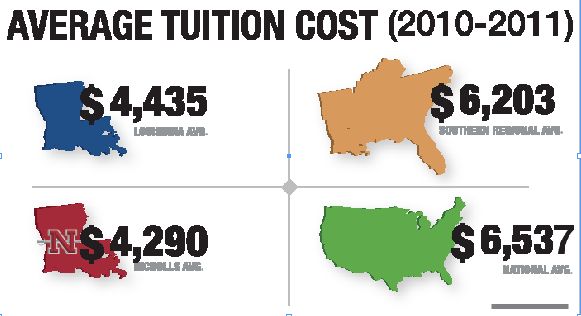Recent legislative action has led to two bills that would allow Louisiana colleges to increase tuition and cap the number of credit hours it takes to graduate from a four-year university.
House Bill 275, recently filed by Louisiana State Representative John Schroder, would allow Louisiana colleges and universities to increase tuition to the Southern Regional Education Board average, which is currently $6,203, in an effort to make up for state budget cuts.
The bill, also called the “Tuition Equalization Bill,” is assigned to the House Education Committee.
According to The Morning Advocate, Louisiana still has one of the lowest tuition levels in the country despite recent tuition increases.
“We need to get out of the tuition business,” Schroder said. “Colleges need to operate like a business.”
The Southern region has the lowest tuition levels in the country, and Louisiana students have traditionally paid significantly less than their regional peers.
According to data from the Southern Regional Education Board, the average annual tuition and fees in Louisiana was $4,435 in 2010-11. The Southern regional average was $6,203, and the national average was $6,537.
In the same year, tuition and fees at Nicholls was $4,290, which is less than the state average.
According to The Houma Courier, Nicholls students would have seen a 31 percent tuition jump from $4,290 to $6,203 had the bill taken effect in 2010.
University president Stephen Hulbert said students won’t “suddenly” find themselves paying the same as other universities. He said, “ideally,” he would like to keep tuition low, but the state-wide budget cuts have made that impractical.
Larry Howell, University executive vice president, said the University has already implemented a 10 percent tuition increase in accordance with the LA GRAD Act.
“It would be a gradual thing,” Howell said. “We would never all-of-a-sudden increase our tuition by that big of a percentage.”
If the Southern average continues to increase and Nicholls continues to add the 10 percent annual tuition increase, the University would not catch up to the Southern Regional Education Board average for more than 10 years.
“The reality is the state is no longer able to fund higher education,” Hulbert said in The Houma Courier. “The cost of the tuition is going up. That’s the reality.”
Hulbert said the tuition increases will also affect the state’s scholarships, like Taylor Opportunity Program for Students (TOPS), because the awards will have to increase as tuition increases.
Senate Bill 103 by Louisiana State Senator Ben Nevers is another legislative proposal that, if passed, will affect colleges and universities.
According to The Associated Press, this bill would cap the number of credit hours it would take for most Louisiana college students to receive a degree from a four-year university.
The proposal, going to the full Senate and House of Representatives for debate, would cap the requirement at 120 hours of credit. It includes an exception for those degrees that require more course hours under certification rules, like engineering programs.
Senate Bill 103 was one of the recommendations of a higher education study panel. Nevers said it would speed up the process for students to receive a degree and decrease loan costs.
Howell explained that Nicholls is ahead in this aspect.
“With very few exceptions, we have gotten most of our majors down to 120 hours in the last four to five years,” Howell said. “There are a few that require a little more for accreditation purposes, and I think the legislation is trying to steer other schools in that direction too.”
Howell said that the legislators still have many details to agree upon, but each has pros and cons.
“I don’t know how far these bills are going to go,” Howell said. “There’s another one out there to charge students per credit hour. That would make more sense. If students pay for each credit hour, that might make them less likely to drop.”














